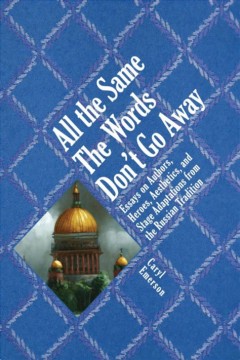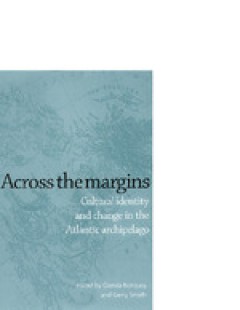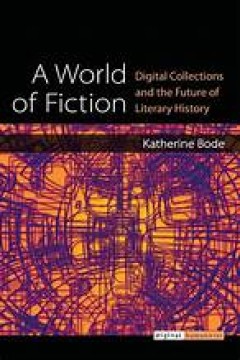Filter by

All the Same The Words Don't Go Away: Essays on Authors, Heroes, Aesthetics, …
Twenty-five years of essays and reviews, linked loosely by three themes. First is the creative potential inherent in transposing classic literary texts into other genres of media (operatic, dramatic) and the responsibilities, if any, that govern the transposer, audience, and critic. The practice of transposition, however, gives rise to a creative conflict: is there a limit to the amount of orna…
- Edition
- -
- ISBN/ISSN
- 9781934843819
- Collation
- 450 hlm; ill., lamp.,
- Series Title
- -
- Call Number
- -

Alienation Effects
Exciting new scholarship has been emerging as performance studies scholars begin to turn their attention to the performance of politics, nationhood, and jurisprudence. Branislav Jakovljevic's project on the history and eventual demise of the former Yugoslavia demonstrates how fruitful this approach can be. Jakovljevic considers the concept of theatricality as central to understanding the events…
- Edition
- -
- ISBN/ISSN
- 9780472073146
- Collation
- 370 hlm; ill., lamp.,
- Series Title
- -
- Call Number
- -

Alexander Lernet-Holenia und Maria Charlotte Sweceny : Briefe 1938-1945
In the centre of this study stand some 154 letters exchanged between the Austrian writer Alexander Lernet-Holenia (1897-1976) and Maria Charlotte ("Lotte") Sweceny (ne?e Stein, 1904-1956), the co-proprietor of the Viennese publishing house Manz, between 1938 and 1945. The transcripts are followed by a commentary that aims to elucidate the historical, individual and geographical references. A me…
- Edition
- -
- ISBN/ISSN
- 9783205788874
- Collation
- 462 hlm; ill., lamp.,
- Series Title
- -
- Call Number
- -

Art Outside the Lines
This collection of essays, written by leading scholars in the fields of East German art, film, literature, music, and museum studies, seeks to renegotiate the artistic legacy of the German Democratic Republic. Combining a range of theoretical and practical perspectives, the volume challenges the narrow frameworks of totalitarianism and Ostalgie that have dominated discussions of art produced in…
- Edition
- -
- ISBN/ISSN
- 9789042033412
- Collation
- oer.unej.ac.id
- Series Title
- German Monitor,
- Call Number
- -

A History of Bulgarian Literature 865-1944
provides a comprehensive survey of Bulgarian literary development from the conversion to Christianity and the creation of Old Church Slavonic (c. 865) through World War II, highlighting key periods like the medieval ecclesiastical era, the Ottoman subjugation, the National Revival (Renaissance), post-liberation realism, and the rise of modernism and political influences, showcasing the evolutio…
- Edition
- -
- ISBN/ISSN
- 9783110810608
- Collation
- 282 hlm
- Series Title
- -
- Call Number
- -

Afterlives of the Garden
The collection of essays in this volume offers fresh insights into varied modalities of reception of Epicurean thought among Roman authors of the late Republican and Imperial eras. Its generic purview encompasses prose as well as poetic texts by both minor and major writers in the Latin literary canon, including the anonymous poems, Ciris and Aetna, and an elegy from the Tibullan corpus by the …
- Edition
- Sergio Yona
- ISBN/ISSN
- 9783111029733
- Collation
- 190
- Series Title
- CICERO
- Call Number
- -

Across the margins: Cultural identity
Across the margins offers a comparative, theoretically informed analysis of the cultural formation of the Atlantic Archipelago. In its overall conception and in specific contributions (including an introductory essay), this collection demonstrates the benefits of working across the disciplines of history, geography, literature and cultural studies, but also presents new configurations of cultur…
- Edition
- -
- ISBN/ISSN
- 9780719057496
- Collation
- oer.unej.ac.id
- Series Title
- -
- Call Number
- -

20 More: Selected Stories from Drue Heinz Literature Prize Winners, 2001-2021
---
- Edition
- -
- ISBN/ISSN
- 9780822988656
- Collation
- -
- Series Title
- -
- Call Number
- -

A World of Fiction: Digital Collections and the Future of Literary History
During the 19th century, throughout the Anglophone world, most fiction was first published in periodicals. In Australia, newspapers were not only the main source of periodical fiction, but the main source of fiction in general. Because of their importance as fiction publishers, and because they provided Australian readers with access to stories from around the world—from Britain, America and …
- Edition
- -
- ISBN/ISSN
- 9780472130856
- Collation
- oer.unej.ac.id
- Series Title
- Digital Humanities,
- Call Number
- -

A war of individuals: Bloomsbury attitudes to the Great War
This book draws together for the very first time examples of the 'aesthetic pacifism' practised during the Great War by such celebrated individuals as Virginia Woolf, Siegfried Sassoon and Bertrand Russell. In addition, the book outlines the stories of those less well-known who shared the mind-set of the Bloomsbury Group when it came to facing the first 'total war'. The research for this study …
- Edition
- -
- ISBN/ISSN
- -
- Collation
- oer.unej.ac.id
- Series Title
- -
- Call Number
- Literary studies: c 1900 to c 2000
 Computer Science, Information & General Works
Computer Science, Information & General Works  Philosophy & Psychology
Philosophy & Psychology  Religion
Religion  Social Sciences
Social Sciences  Language
Language  Pure Science
Pure Science  Applied Sciences
Applied Sciences  Art & Recreation
Art & Recreation  Literature
Literature  History & Geography
History & Geography